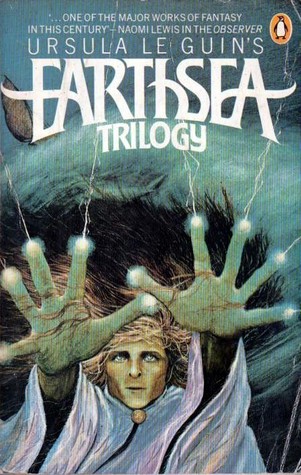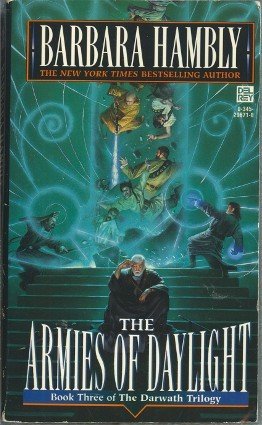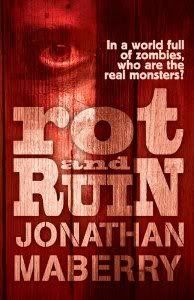I wonder how many authors set out to write trilogies. Tolkien, for instance, intended the Lord of the Rings to be the first big ass volume of a two-volume set (the second being the equally big ass The Silmarillion), as well as the sequel to The Hobbit. His publisher sensibly refused to do this, instead dividing up LOTR into three books. On the opposite end of the spectrum, Peter Jackson took The Hobbit (which would have made a fine two and a half, possibly three hour movie) and created a cinematic trilogy padded with action scenes destined to become amusement park theme rides.
"Star Wars," to use another cinematic example, was originally a standalone movie, the perfect hero's journey complete with fairytale ending. It didn't become a trilogy (and then an intended ennealogy, which Wikipedia assures me is the correct term for a series with nine entries) until the original movie broke box office records. If the first movie had bombed, there would be no "Luke, I am your father" spoiler, those of us with the hots for Han Solo could tell ourselves Luke won the princess's hand, and there would be no Jar Jar Binks. On the other hand, we would not have the description "Han in Carbonite" as convenient shorthand for a cliffhanger ending in the second book of a trilogy.
Good world building and/or a compelling cast of characters can translate into a successful multiple volume book series. A lot of authors write each one as a standalone so no matter which book in a series a reader picks up, there are relatively few spoilers and a satisfactory -- and complete -- story arc. Each book in a continuing series moves the characters forward, relationships progress, and there's often unexpected reappearances from other characters - often antagonists -- assumed dead or defeated -- but every book ends with that world's equivalent of the One Ring being tossed into the volcano. In your face, Sauron! Readers don't have to wait until the next book to find out if Han gets defrosted.
With a trilogy, there is an overall story arc and/or unifying theme that carries through all three books. In ones with continuing characters, smaller quests may be wrapped up at the end of each one, but the main "hero's journey" or story arc is not completed until the end of the third book. Even more irritating, the second book often ends with a cliffhanger, which can be really frustrating when you know you have to wait for another six months to a year to find out what happens. I personally get a bit cranky when I'm made to wait, but when the books are just that good... the waiting makes the eventual gratification that much better.
Some people view cliffhangers as a deliberate ploy to get readers to buy the author's next book. Well, of course we want you to read our next book, but it's rarely that Machiavellian. Often it's as simple as having to stick to an allowed word count, which doesn't always allow for a neatly wrapped up ending. And with or without cliffhangers, f you don't want to read the next book in a series, be it a dualogy, trilogy or whatever-the-hell-ology, the author isn't doing his or her job.
Which leads me to my favorite seven trilogies. These books hooked me from the start, with worlds and characters that I've revisited more than once since the first reading. Please keep in mind these are my personal favorites, ones from my childhood onwards! If yours aren't listed here, please feel free to chime in and recommend them.
![]()
Harper Hall Trilogy by Anne McCaffrey
McCaffrey's YA series set in Pern, made a huge impression on me when I read them in the early '70s. The 15 year-old heroine, Menolly, is a talented musician in a society where music is strictly a menfolk thing. She runs away rather than accept the status quo, rescues a clutch of fire dragon eggs, and is rescued by a dragonrider during one of the dreaded Threadfalls (Pern's equivalent of acid rain). Menolly and her now hatched fire-lizards are taken to Harper Hall, where she begins a new journey as an apprentice. The books have romance, dragons, a plucky heroine who starts as an outcast and, because of her talent and bravery, attains her dreams. What's not to love, especially when you're an awkward pre-adolescent girl?
![]()
Earthsea Trilogy by Ursula LeGuin
Another series I loved as a pre-teen and have since re-read several times. This richly imagined trilogy deals with different cultures and has a strong feminist message, neither of which I noticed when I first read 'em. Apprentice wizards, wizardry school (way pre-Harry Potter!), evil shadows, rifts between worlds, gods called The Nameless Ones demanding human sacrifices, dragons... all irresistible elements to a kid who loved Dark Shadows, the Narnia books, Hammer horror films, and Japanese monster movies. Don't bother with the TV movie adaptation if you're a fan of the books, though. It well and truly sucked.
![]()
The Darwath Trilogy by Barbara Hambly
I discovered Barbara Hambly's books when I hit my mid-twenties. To steal a quote from Amazon: Barbara Hambly's celebrated trilogy about a murderous force that threatens a far-off magical world and the two ordinary Californians who are drawn into the battle to save mankind. Ostensibly a fantasy series, these books cross over into the urban fantasy and horror genres, taking two people (a biker and a history scholar) from modern day California and plunking them down on a world in another dimension where magic exists and an ancient evil known only as The Dark has burst from below the earth, threatening to wipe out the entire civilization. Hambly's descriptions of the Dark, their attacks, and their subterranean Nests are as unflinchingly horrific as anything Stephen King has ever conjured, and her characters memorable and real. Hambly wrote more books set in this world and some other kickass series, but The Darwath Trilogy remains my favorite.
![]()
With Fire & Sword Trilogy by Henryk Sienkiewicz
The first book, With Fire and Sword has been called the Polish Gone with the Wind by the New York Times and it's not a bad description. Set in the 17 Century during the Cossack led-peasant uprising, it has romance, humor, shirt-rending angst, swordfights, fantastic battle scenes, and larger than life characters. The Deluge and Fire in the Steppe continue the saga, with the third book offering a feisty sword-fighting heroine who makes up for the 'strong willed, but needs to be rescued' Helena in With Fire and Sword, and the 'too pure for this world' Olenka in The Deluge.
![]()
Hunger Games Trilogy by Suzanne Collins
No description really necessary 'cause if you haven't read the books, you've mostly likely seen the movies based on Suzanne Collins' dystopian trilogy, which I suspect had to be influenced by Battle Royale. There are arguments that the third book did not live up to the promise of the first two, and while I'll agree it's got its flaws, it still delivers the same emotional highs, lows, and punches to the gut that the first two had. And if you didn't cry when Katniss is reunited with Buttercup at the end of Mockingjay, you have no soul. Yeah... okay, that was just a bit judgmental. But I meant it.
![]()
His Dark Materials Trilogy by Philip Pullman
My sister, who first plunked The Silver Chair by C.S. Lewis on my lap when I was seven or eight and said "read this!" (and I did, and I loved it) also bought me His Dark Materials trilogy for Christmas a few years back and said "read this!" I did and I loved them. A Chronicles of Narnia for a new generation, His Dark Materials is definitely more sophisticated and subtle, lacking the thinly veiled Christian subtext that permeated C.S. Lewis's work. The movie adaptation was fantastic, IMO.
![]()
Rot & Run/The Benny Imura Tetralogy by Jonathan Maberry
Even though this is a four book series instead of three, Maberry's Benny Imura books follow the rules of a trilogy by giving us a fast-paced, action-packed storyline that carries through all four books, with a satisfactory end and some of the best, most satisfying character arcs I've ever read. Set in the aftermath of a zombocalpyse, this series delivers everything a young adult, new adult or adult reader could ask for, including strong female protagonists, a well thought out reason for the zombie plague, great action sequences, a Joss Whedonesque ability to kill off characters with no warning but good reason, and a surprise appearance by... well, you'll have to read the books and find out. Suffice to say Maberry doesn't just tie together all the threads in these four books, but ties in elements from his other books (the Joe Ledger series and Dead/Fall of Night) as well.
Dana Fredsti is the author of Plague World.
"Star Wars," to use another cinematic example, was originally a standalone movie, the perfect hero's journey complete with fairytale ending. It didn't become a trilogy (and then an intended ennealogy, which Wikipedia assures me is the correct term for a series with nine entries) until the original movie broke box office records. If the first movie had bombed, there would be no "Luke, I am your father" spoiler, those of us with the hots for Han Solo could tell ourselves Luke won the princess's hand, and there would be no Jar Jar Binks. On the other hand, we would not have the description "Han in Carbonite" as convenient shorthand for a cliffhanger ending in the second book of a trilogy.
Good world building and/or a compelling cast of characters can translate into a successful multiple volume book series. A lot of authors write each one as a standalone so no matter which book in a series a reader picks up, there are relatively few spoilers and a satisfactory -- and complete -- story arc. Each book in a continuing series moves the characters forward, relationships progress, and there's often unexpected reappearances from other characters - often antagonists -- assumed dead or defeated -- but every book ends with that world's equivalent of the One Ring being tossed into the volcano. In your face, Sauron! Readers don't have to wait until the next book to find out if Han gets defrosted.
With a trilogy, there is an overall story arc and/or unifying theme that carries through all three books. In ones with continuing characters, smaller quests may be wrapped up at the end of each one, but the main "hero's journey" or story arc is not completed until the end of the third book. Even more irritating, the second book often ends with a cliffhanger, which can be really frustrating when you know you have to wait for another six months to a year to find out what happens. I personally get a bit cranky when I'm made to wait, but when the books are just that good... the waiting makes the eventual gratification that much better.
Some people view cliffhangers as a deliberate ploy to get readers to buy the author's next book. Well, of course we want you to read our next book, but it's rarely that Machiavellian. Often it's as simple as having to stick to an allowed word count, which doesn't always allow for a neatly wrapped up ending. And with or without cliffhangers, f you don't want to read the next book in a series, be it a dualogy, trilogy or whatever-the-hell-ology, the author isn't doing his or her job.
Which leads me to my favorite seven trilogies. These books hooked me from the start, with worlds and characters that I've revisited more than once since the first reading. Please keep in mind these are my personal favorites, ones from my childhood onwards! If yours aren't listed here, please feel free to chime in and recommend them.

Harper Hall Trilogy by Anne McCaffrey
McCaffrey's YA series set in Pern, made a huge impression on me when I read them in the early '70s. The 15 year-old heroine, Menolly, is a talented musician in a society where music is strictly a menfolk thing. She runs away rather than accept the status quo, rescues a clutch of fire dragon eggs, and is rescued by a dragonrider during one of the dreaded Threadfalls (Pern's equivalent of acid rain). Menolly and her now hatched fire-lizards are taken to Harper Hall, where she begins a new journey as an apprentice. The books have romance, dragons, a plucky heroine who starts as an outcast and, because of her talent and bravery, attains her dreams. What's not to love, especially when you're an awkward pre-adolescent girl?

Earthsea Trilogy by Ursula LeGuin
Another series I loved as a pre-teen and have since re-read several times. This richly imagined trilogy deals with different cultures and has a strong feminist message, neither of which I noticed when I first read 'em. Apprentice wizards, wizardry school (way pre-Harry Potter!), evil shadows, rifts between worlds, gods called The Nameless Ones demanding human sacrifices, dragons... all irresistible elements to a kid who loved Dark Shadows, the Narnia books, Hammer horror films, and Japanese monster movies. Don't bother with the TV movie adaptation if you're a fan of the books, though. It well and truly sucked.

The Darwath Trilogy by Barbara Hambly
I discovered Barbara Hambly's books when I hit my mid-twenties. To steal a quote from Amazon: Barbara Hambly's celebrated trilogy about a murderous force that threatens a far-off magical world and the two ordinary Californians who are drawn into the battle to save mankind. Ostensibly a fantasy series, these books cross over into the urban fantasy and horror genres, taking two people (a biker and a history scholar) from modern day California and plunking them down on a world in another dimension where magic exists and an ancient evil known only as The Dark has burst from below the earth, threatening to wipe out the entire civilization. Hambly's descriptions of the Dark, their attacks, and their subterranean Nests are as unflinchingly horrific as anything Stephen King has ever conjured, and her characters memorable and real. Hambly wrote more books set in this world and some other kickass series, but The Darwath Trilogy remains my favorite.

With Fire & Sword Trilogy by Henryk Sienkiewicz
The first book, With Fire and Sword has been called the Polish Gone with the Wind by the New York Times and it's not a bad description. Set in the 17 Century during the Cossack led-peasant uprising, it has romance, humor, shirt-rending angst, swordfights, fantastic battle scenes, and larger than life characters. The Deluge and Fire in the Steppe continue the saga, with the third book offering a feisty sword-fighting heroine who makes up for the 'strong willed, but needs to be rescued' Helena in With Fire and Sword, and the 'too pure for this world' Olenka in The Deluge.

Hunger Games Trilogy by Suzanne Collins
No description really necessary 'cause if you haven't read the books, you've mostly likely seen the movies based on Suzanne Collins' dystopian trilogy, which I suspect had to be influenced by Battle Royale. There are arguments that the third book did not live up to the promise of the first two, and while I'll agree it's got its flaws, it still delivers the same emotional highs, lows, and punches to the gut that the first two had. And if you didn't cry when Katniss is reunited with Buttercup at the end of Mockingjay, you have no soul. Yeah... okay, that was just a bit judgmental. But I meant it.

His Dark Materials Trilogy by Philip Pullman
My sister, who first plunked The Silver Chair by C.S. Lewis on my lap when I was seven or eight and said "read this!" (and I did, and I loved it) also bought me His Dark Materials trilogy for Christmas a few years back and said "read this!" I did and I loved them. A Chronicles of Narnia for a new generation, His Dark Materials is definitely more sophisticated and subtle, lacking the thinly veiled Christian subtext that permeated C.S. Lewis's work. The movie adaptation was fantastic, IMO.

Rot & Run/The Benny Imura Tetralogy by Jonathan Maberry
Even though this is a four book series instead of three, Maberry's Benny Imura books follow the rules of a trilogy by giving us a fast-paced, action-packed storyline that carries through all four books, with a satisfactory end and some of the best, most satisfying character arcs I've ever read. Set in the aftermath of a zombocalpyse, this series delivers everything a young adult, new adult or adult reader could ask for, including strong female protagonists, a well thought out reason for the zombie plague, great action sequences, a Joss Whedonesque ability to kill off characters with no warning but good reason, and a surprise appearance by... well, you'll have to read the books and find out. Suffice to say Maberry doesn't just tie together all the threads in these four books, but ties in elements from his other books (the Joe Ledger series and Dead/Fall of Night) as well.
Dana Fredsti is the author of Plague World.